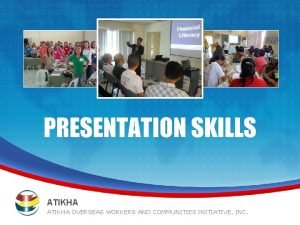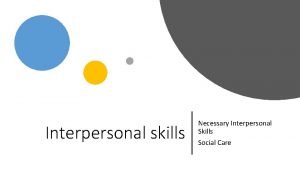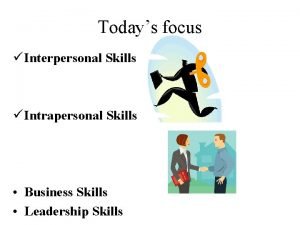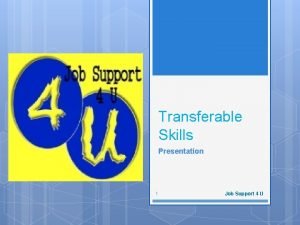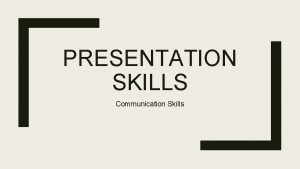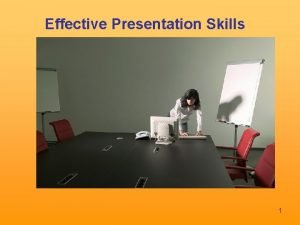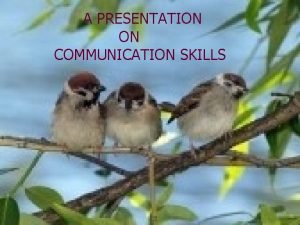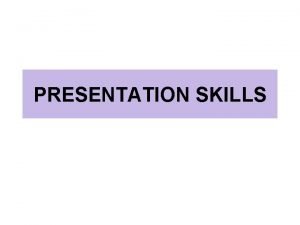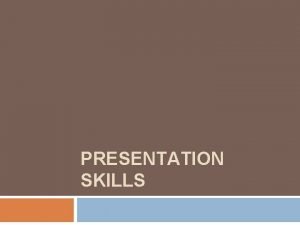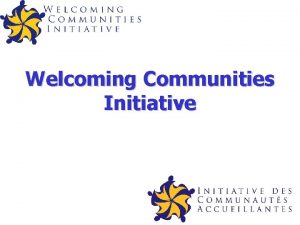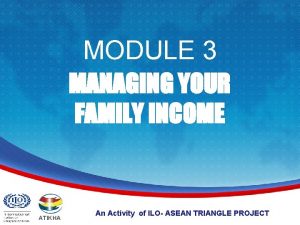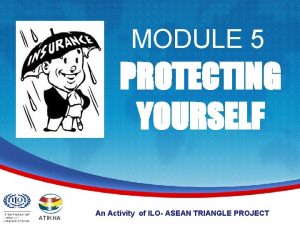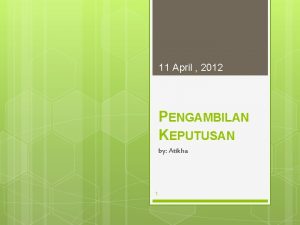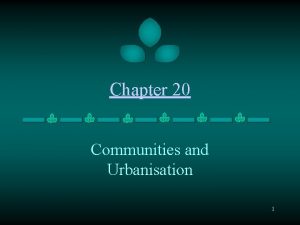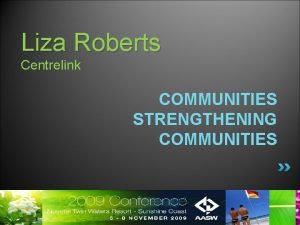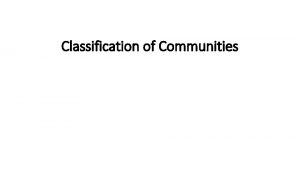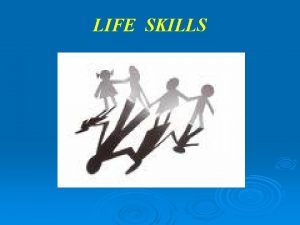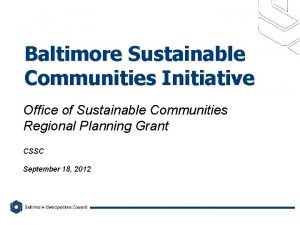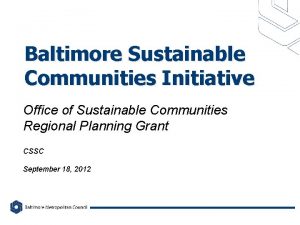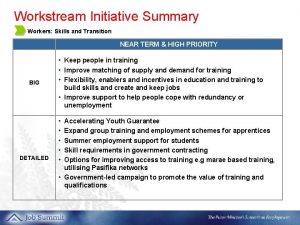PRESENTATION SKILLS ATIKHA OVERSEAS WORKERS AND COMMUNITIES INITIATIVE


































- Slides: 34

PRESENTATION SKILLS ATIKHA OVERSEAS WORKERS AND COMMUNITIES INITIATIVE, INC. www. atikha. org 1

CREATING A LEARNING ENVIRONMENT F A C T O R S BARRIERS TO LEARNING ADDRESSING BARRIERS INTERNAL Previous experiences, biases, lack of motivation Establish the objectives of the training and what is in it for the participants ENVIRONMENT Temperature, noise, ensuring confidentiality TRAINER Ensure venue is conducive to learning (quiet, secure, sitting arrangements) Prepare yourself Voice, lack of (content and delivery); preparation, mannerisms, be mindful of behavior mannerisms and behaviours www. atikha. org 2

FORMAT OF PRESENTATION www. atikha. org 3

PRESENTATION TIPS www. atikha. org 4

PRESENTATION TIP 1 PREPARE THE PARTICIPANTS for the activity or seminar. www. atikha. org 5

PRESENTATION TIP 2 TALK WITH THE PARTICIPANTS www. atikha. org Do not read notes. Do not read visuals verbatim. Ask questions. Spice up presentation with humour, quotes, stories. 6

PRESENTATION TIP 3 USE THE SLIDES PROPERLY www. atikha. org Use pointer. Give participants 15 seconds to read Face the audience Don’t walk between projector and screen. 7

PRESENTATION TIP 4 MAINTAIN EYE CONTACT Find friendly faces Don’t let impress‐me‐type” distract you www. atikha. org 8

PRESENTATION TIP 5 USE GESTURES; AVOID MANNERISMS Gestures emphasize a point. Mannerisms distract www. atikha. org 9

PRESENTATION TIP 6 MOVE IN A WAY THAT SUPPORTS YOUR MESSAGE BODY POSITION Full front STRONG AREAS Three quarters Area 1 is strongest www. atikha. org 10

PRESENTATION TIP 7 ENTERTAIN QUESTIONS OR COMMENTS and handle them properly. www. atikha. org 11

DEALING WITH QUESTIONS www. atikha. org 12

DEALING WITH QUESTIONS 1 Listen carefully 2 Make sure you have understood the question correctly 3 Reformulate the question in your words 4 If you want to postpone the question, say it politely www. atikha. org 13

DEALING WITH QUESTIONS 5 If you don’t know the answer, say so and offer to find out 6 Answer irrelevant questions politely but briefly 7 Check that the questioner is satisfied with the answer. www. atikha. org 14

DEALING WITH NERVOUSNESS www. atikha. org 15

DEALING WITH NERVOUSNESS PREPARE WELL Knowing exactly what you want to say and practice saying it LEARN TO RELAX Do stretching, breathing exercise before talk CHECK OUT ROOM Make yourself familiar with the place, Arrive early. www. atikha. org 16

DEALING WITH NERVOUSNESS CONCENTRATE ON THE MESSAGE Concentrate on the message and the audience, not yourself VISUALIZE SUCCESS Imagine yourself in loud and clear voice and imagine the applause after your presentation www. atikha. org 17

ROLES AND RESPONSIBILITIES OF FACILITATORS BRING LEARNING GUIDE NOT LECTURING NOT LEAD ENGAGE NOT DIRECT www. atikha. org 18

HANDLING DIFFICULT PARTICIPANTS www. atikha. org 19

HANDLING DIFFICULT PARTICIPANTS TYPE 1 THE TALKER/ KNOW IT-ALL He/She has opinions on every subject and states them in a very authoritative manner www. atikha. org 20

HANDLING DIFFICULT PARTICIPANTS WHAT TO DO WITH THE TALKER/ KNOW IT-ALL 1. Thank the person and move on to the next subject. 2. Ask others to comment on his remarks. 3. Thank the person for his participation and indicate it is time to hear from others. 4. Politely ask the person to give someone else a chance. 5. Use humor to invite others to speak up. 6. Deliberately turn to others and ask for their opinions www. atikha. org 21

HANDLING DIFFICULT PARTICIPANTS TYPE 2 THE FIGHTER/ ARGUER He/She is quick to find fault with the material or instructor. www. atikha. org 22

HANDLING DIFFICULT PARTICIPANTS THE FIGHTER/ ARGUER WHAT TO DO: 1. Keep your cool; you will never win the argument 2. Acknowledge the level of passion and ask for the reason behind it 3. Avoid getting personal 4. Refer the question to the group and then to him. 5. Pretend not to hear him. 6. If nothing else works, suggest that your differences be cleared up later www. atikha. org 23

HANDLING DIFFICULT PARTICIPANTS TYPE 3 THE QUIET ONE OR WITHDRAWER He/She is non-participative and passive. www. atikha. org 24

HANDLING DIFFICULT PARTICIPANTS THE QUIET ONE OR WITHDRAWER WHAT TO DO: 1. Treat with respect 2. Pose a question that relates to his/her concern. 3. Use his/her name in hypothetical examples or stories to entice into the group www. atikha. org 25

HANDLING DIFFICULT PARTICIPANTS TYPE 4 THE COMPLAINER He/She complains about anything and everything. Focused on what is wrong or bad rather than what is right or good. www. atikha. org 26

HANDLING DIFFICULT PARTICIPANTS THE COMPLAINER WHAT TO DO: 1. If the complain is valid: Apologize for the person’s distress, thank the person for bringing up the issue, initiate action to resolve the issue and move on. 2. If the complain is not valid: Explain that the desired recourse is not possible, use humor to defuse the situation, avoid getting personal, refer the issue to the rest of the group, to show that the concern is not shared. www. atikha. org 27

HANDLING DIFFICULT PARTICIPANTS TYPE 5 THE UNCONSCIOUSLY INCOMPETENT Thinks he/she already has correct knowledge, skills, and ability when the truth he/she does not. www. atikha. org 28

HANDLING DIFFICULT PARTICIPANTS THE UNCONSCIOUSLY INCOMPETENT WHAT TO DO: 1. During the introduction, request all the participants to input so everyone can learn and to determine the extent of all participants’ knowledge to the topic 2. Also mention that you appreciate that some folks may feel the training is unnecessary www. atikha. org 29

HANDLING DIFFICULT PARTICIPANTS TYPE 6 THE DISTRACTER Ask questions or raises issues not related to topic discussed www. atikha. org 30

HANDLING DIFFICULT PARTICIPANTS THE DISTRACTER WHAT TO DO: 1. Establish ground rules for basic courtesies 2. Thank the person for his/her energy and involvement, then explain your time or agenda constraints. www. atikha. org 31

HANDLING DIFFICULT PARTICIPANTS TYPE 7 THE RAMBLER He/She makes grandiose theories or complicates simple ideas. www. atikha. org 32

HANDLING DIFFICULT PARTICIPANTS THE RAMBLER WHAT TO DO: 1. Create ground rules for basic courtesies 2. Summarize and recap key points prior to person’s statement 3. Stand beside her. Put her in charge of an activity 4. Say “Thank you, but let’s see what others have to say, now. ” 5. Try comments such as, "Interesting, but could you hold it until later? " www. atikha. org 33

THANK YOU WEBSITE: TELEFAX NO. : www. atikha. org (+6345) 562 -3156 EMAIL: MOBILE NO. : atikha@atikha. org (+63917) 569 -1031 ATIKHA OVERSEAS WORKERS AND COMMUNITIES INITIATIVE, INC. www. atikha. org 34
 Atikha
Atikha Women migration
Women migration What is the definition of ecological succession
What is the definition of ecological succession Interpersonal skills social work
Interpersonal skills social work Monash university exchange program
Monash university exchange program How much money
How much money Overseas chinese population
Overseas chinese population Zip trading overseas ab
Zip trading overseas ab Cdc jobs overseas
Cdc jobs overseas Ktk overseas ag
Ktk overseas ag Overseas private investment corp
Overseas private investment corp New global connections test answers
New global connections test answers Lesson 1 europeans explore overseas
Lesson 1 europeans explore overseas Portfolium suss
Portfolium suss Office of overseas schools
Office of overseas schools Building overseas empires
Building overseas empires Interpersonal and intrapersonal skills examples
Interpersonal and intrapersonal skills examples Hard skills soft skills
Hard skills soft skills 5cm labor
5cm labor Leopold's maneuver
Leopold's maneuver Hfojobs
Hfojobs Skills passport
Skills passport Transferable skills presentation
Transferable skills presentation Presentation definition in communication
Presentation definition in communication Interpersonal and intrapersonal skills ppt
Interpersonal and intrapersonal skills ppt Minneapolis presentation skills
Minneapolis presentation skills Objective of presentation skills
Objective of presentation skills Presentation on listening skills
Presentation on listening skills Artifactics
Artifactics International skills diploma seal presentation
International skills diploma seal presentation Presentation parts
Presentation parts Presentation skills assignment
Presentation skills assignment Why presentation skills training
Why presentation skills training Communication skills training st. paul, minnesota
Communication skills training st. paul, minnesota My career path powerpoint presentation
My career path powerpoint presentation
